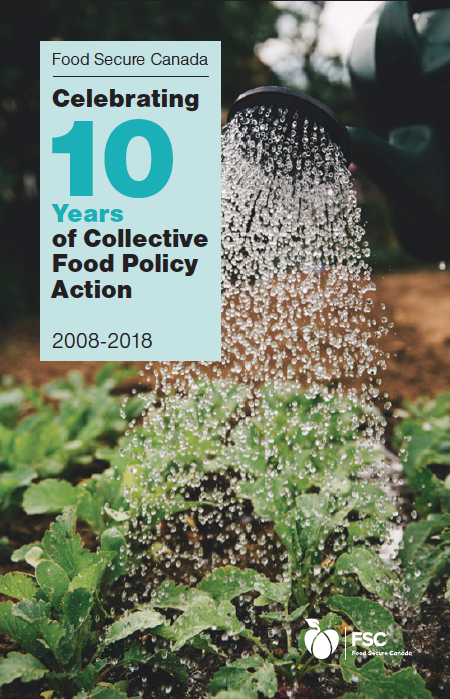Our Story
The idea of Food Secure Canada first emerged at a conference: Working Together: Civil Society Input for Food Security in Canada, which was held on 15-17 June 2001, at Ryerson Polytechnic University, Toronto. This conference brought together representatives of various civil society organizations and networks from every province and territory to develop strategies for increasing Canada 's commitment on Food Security, both domestically and internationally. Near the end of the conference, the following resolution was passed unanimously, which lays the groundwork for where we are at today:
|
"The Conference resolves that there is a need for a national Canadian Food Security Network and that the organizing committee has the temporary mandate to explore ways of facilitating this and opening it up to a broad-based national membership." |
Food Assembly - Winnipeg 2004
From October 14-16, 2004, over 200 people from throughout Canada met in Winnipeg. They represented a diverse group of organizations and individuals working on food security domestically and internationally met in Winnipeg. On October 16 – World Food Day – the conference agreed that an organization would be formed to advocate and speak on food security issues facing Canada. An interim organizing committee was formed to define the shape that the organization would take.
The conference unanimously agreed on three principles:
• Zero hunger
• A sustainable food system
• Healthy and safe food
This organization would be open to individuals and groups. The conference agreed to convene around next World Food Day, tentatively in Waterloo, Ontario to ratify the work of the interim steering committee and to elect officers to the new organization.
National Food Security Assembly - Waterloo 2005
The Waterloo Assembly was held September 30-October 1, 2005. It was a jam-packed event with workshops arranged according to FSCs three commitments, each of which came up with action recommendations. These were summarized into an Action Agenda. The Assembly also elected an initial Steering Committee, which spent the next year finalizing the organization’s Constitution and Bylaws. Three working papers, on Child Nutrition, the Right to Food, and Food Localism were developed and circulated to the membership for consideration. An International Working Group was also formed to monitor Canada’s actions and policies on the global stage.

Bi-national Food Security Conference - Vancouver 2006
In October 2006, FSC collaborated with the Community Food Security Coalition of the USA to present a bi-national conference in Vancouver, BC. About 900 people attended the conference Bridging Borders Toward Food Security, half of them from Canada, testament to the growing interest in food security and the strength of the movement across the continent. A new Steering Committee was elected, and the working paper groups were asked to revise their papers according to members’ feedback. Decisions were taken to join the International Alliance Against Hunger, to support a continued moratorium on Terminator Technology and to hold Assemblies every other year, recognizing the financial and climate cost of cross-country travel.
Food Secure Canada’s formal incorporation - 2006
FSC was formally incorporated as a non-profit organization in October 2006.
FSC’s National Assembly - Ottawa 2008
The 5th FSC Assembly, Our Food System: A Call to Action, was held in Ottawa in November, 2008, in collaboration with FoodNet Ontario. In addition to 5 plenary sessions and 25 workshops (in both official languages), the more than 300 participants discussed an action plan and agreed to support the People's Food Policy Project as a key activity for the coming two years.
Bringing Food Sovereignty to Canada – The People’s Food Policy Project - 2009
Between 2009 and 2011, 3,500 people across Canada contributed to what became Resetting the Table – A People’s Food Policy for Canada. This was made possible thanks to the support and dedication of over 100 volunteers and members of FSC’s networks. It was launched in April 2011 amidst a federal election campaign that saw food policies in the platforms of all five federal parties for the first time in history. Resetting the Table was formally adopted as FSC’s platform later that year.
The citizen engagement process that was developed as part of the People’s Food Policy Project, including kitchen table talks, remains a model of how to practice food democracy and food policy development here and abroad.
Ramping Up to Influence Policy - FSC Hires its First Staff - 2011
In November 2011, 40 food leaders and FSC members gathered for a two-day retreat and agreed that FSC’s primary role was to give voice to the food movement at the federal level. Modest savings from previous assemblies were invested in hiring 2 full time staff to make this vision a reality. The first staffed office opened its doors in Montreal in March, 2012.
FSC’s first staff, first office and the UN comes to visit...
Mission to Canada: The UN Special Rapporteur on the Right to Food - 2012
In May 2012, Olivier de Schutter, the UN Special Rapporteur on the Right to Food, conducted a mission to Canada. Working with members and partners, FSC facilitated a joint submission for the Special Rapporteur by non-governmental organizations. During the visit FSC supported his meetings with civil society groups, Aboriginal leaders and food policy experts in Montreal, Ottawa, Toronto and Winnipeg, as well as written submissions from across the country. FSC worked with the media and parliamentarians to raise the mission’s visibility and impact.
While in Canada, Mr. de Schutter met with government officials, civil society groups and Aboriginal peoples. With assistance from FSC, he was able to meet with civil society groups and experts in Montreal, Ottawa, Toronto and Winnipeg. Many people from other regions of the country were able send him written submissions thanks to the outreach and media work the FSC team undertook. FSC was also able to brief parliamentarians and their staff on the importance of the Mission and several political leaders were able to meet with him directly.
At the end of his visit the Special Rapporteur released his preliminary findings. He put forward a number of policy recommendations to the Government of Canada, including a call for a national right to food strategy, as well as stronger protection overall for economic, social and cultural rights.
FSC’s National Assembly - Edmonton 2012
In the fall of 2012, Food Secure Canada held its 7th Assembly in Edmonton, allowing us to build our movement even more in Western Canada under the theme: Powering Up: Food for the Future, drawing connections between energy and food, reflecting upon food justice issues and bringing a larger contingent of participants from Northern Canada than we had ever before had at one of our events.
Mobilizing as UN Special Rapporteur’s Report on Canada Delivered - Spring 2013
In the spring of 2013, Food Secure Canada mobilized communities right across the country to connect with the UN Special Rapporteur on the right to food as he delivered his report to the UN Council on Human Rights. FSC is still working toward the full implementation of the UN special rapporteur’s report recommendations.
FSC’s National Assembly - Halifax 2014
In 2014, Halifax hosted FSC’s 8th Assembly, with the spotlight on fisheries and all the wonderful food and farming initiatives happening in eastern Canada. With the federal election on the horizon, FSC held its first discussion on highlighting food policy during the federal election campaign.
Eat, Think, Vote - Federal Election 2015
In 2015, the Eat, Think, Vote campaign was conceived. Organisations from across Canada were invited to engage on food policy with candidates running for federal office. FSC highlighted four issues: the need for a guaranteed annual income, the need to support new farmers, the urgent crisis of food insecurity in the North of Canada and the need to have a national school food program. Through the Eat, Think, Vote campaign, 69 events were held from coast to coast to coast, in which candidates from all political parties participated. Once again, local food activists showed that they wanted to engage with policy makers.
The National Food Policy Mandate - November 2015
The Eat, Think Vote campaign was a tremendous success with a mandate from the new Prime Minister for the development of a food policy addressed to the incoming Agriculture Minister (released in November 2015). Following this announcement, FSC immediately focused its attention on national food policy, calling upon the federal government to engage in meaningful conversations on this mandate, as well as to involve all federal departments (e.g. Health Canada, Northern and Indigenous Affairs, ESDC, etc.)
FSC’s National Assembly - Toronto 2016
The emerging shape of Canada’s food policy agenda, and the movement’s ability to influence it, provided a major focus of the 2016 Assembly in Toronto. FSC was not simply designing an ideal food policy, it was actually involved in a process of trying to influence the government’s agenda. Indigenous food sovereignty was a critical theme of the Toronto Assembly, as reconciliation and de-colonization took center stage in the Canadian political debate.
Influencing the Policy Agenda
FSC continued to prepare food policy advocacy work throughout the first half of 2017. At the government’s consultative Food Summit held in June in Ottawa, FSC convened members,  partners and supporters in a national dialogue with several government departments. Simultaneously, FSC worked with its members to develop discussion papers, policy briefs and put forward 5 Big Ideas for reforming Canada’s food system. FSC also engaged for the first time in a multi stakeholder dialogue to develop a consensus proposal on governance to establish a National Food Policy Council.
partners and supporters in a national dialogue with several government departments. Simultaneously, FSC worked with its members to develop discussion papers, policy briefs and put forward 5 Big Ideas for reforming Canada’s food system. FSC also engaged for the first time in a multi stakeholder dialogue to develop a consensus proposal on governance to establish a National Food Policy Council.
Throughout these years, work on building support for healthy school food and in health care institutions, for supporting new farmers and championing indigenous food sovereignty continued. FSC continued to strengthen its organisation by diversifying its funding, improving communications and planning its actions and projects more effectively.
FSC continues to work in partnership with its members to advance the equity, health and sustainability of our food system, with the goal of enhancing the members ability to influence the food policy agenda.
Even when FSC is engaging in high level discussion with government, the goal remains to strengthen the food movement by building the capacity of all citizens to engage in food policy. We all eat, thus have the right to know and influence how our food is produced, and to work together to ensure that all Canadians can have access to healthy and secure food, every day.
Find out more about our 10 years of collective food policy action...
Last update: March 2018

